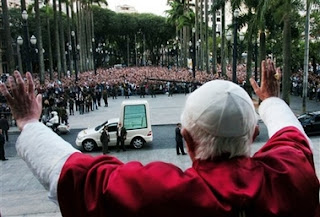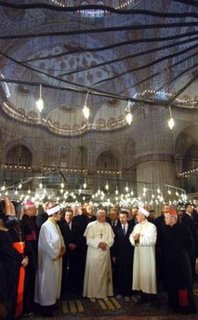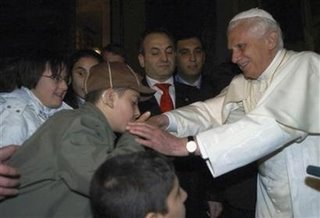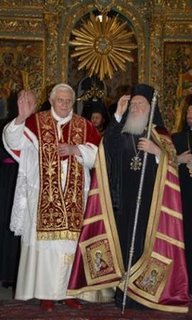
On April 22, 2007, Pope Benedict XVI visited the northern Italian city of Pavia, where he prayed before the remains of St. Augustine. Below is a copy of his homily.
PASTORAL VISIT TO VIGEVANO AND PAVIA (ITALY)
CELEBRATION OF VESPERS
HOMILY OF HIS HOLINESS BENEDICT XVI
Basilica of St Pietro in Ciel d'Oro, Pavia
Third Sunday of Easter, 22 April 2007
Dear Brothers and Sisters,
With this final event, my Visit to Pavia acquires the form of a pilgrimage. This is the form in which I had conceived of it from the outset, desiring to come here to venerate the mortal remains of St Augustine, to express both the homage of the whole Catholic Church to one of her greatest "fathers" and my personal devotion and gratitude to the one who played such an important part in my life as a theologian and a Pastor, but, I would say, even more as a man and a priest.
I renew with affection my greeting to Bishop Giovanni Giudici and I offer a special greeting to Fr Robert Francis Prevost, Prior General of the Augustinians, to the Father Provincial and to the entire Augustinian community. I greet you all with joy, dear priests, men and women religious, consecrated lay people and seminarians.
Providence has deigned that my journey acquire the character of a true and proper Pastoral Visit, and therefore, in this pause for prayer here at the tomb of the Doctor gratiae, I would like to identify a significant message for the Church's progress. This message comes to us from the encounter of the Word of God and the personal experience of the great Bishop of Hippo.
We have listened to the short biblical Reading for Second Vespers of the Third Sunday of Easter (Heb 10:12-14). The Letter to the Hebrews has set us before Christ, the eternal High Priest, exalted to the Father's glory after offering himself as the one perfect sacrifice of the New Covenant in which the work of Redemption was accomplished.
St Augustine fixed his gaze on this mystery and in it he found the Truth he was so ardently seeking. Jesus Christ, the Incarnate Word, the Sacrificed and Risen Lamb, is the Face of God-Love for every human being on his journey along the paths of time towards eternity.
The Apostle John writes in a passage that can be considered parallel to the one just proclaimed in the Letter to the Hebrews: "In this is love, not that we loved God but that he loved us and sent his Son to be the expiation for our sins" (I Jn 4:10). Here is the heart of the Gospel, the central nucleus of Christianity. The light of this love opened Augustine's eyes and led him to encounter the "beauty so old and so new" (Confessions, X, 27) in which alone the human heart finds peace.
Dear brothers and sisters, here, in front of St Augustine's tomb, I would like in spirit to present anew to the Church and to the world my first Encyclical, which contains precisely this central message of the Gospel:
Deus caritas est, God is love (cf. I Jn 4:8,16). This Encyclical, especially Part One, is deeply indebted to the thought of St Augustine, who was in love with the Love of God and sang of it, meditated upon it, preached it in all his writings and above all witnessed to it in his pastoral ministry.
Following in the wake of the teachings of the Second Vatican Council and of my venerable Predecessors John XXIII, Paul VI, John Paul I and John Paul II, I am convinced that humanity today stands in need of this essential message, incarnate in Jesus Christ: God is love. Everything must start from here and everything must lead to here, every pastoral action, every theological treatise.
As St Paul said, "If I ... have not love I gain nothing" (cf. I Cor 13:3). All charisms lose their meaning and value without love, thanks to which instead, all compete to build the Mystical Body of Christ.
Here then is the message that still today St Augustine repeats to the whole Church and in particular, to this diocesan Community which preserves his relics with such veneration. Love is the soul of the Church's life and of her pastoral action. We heard it this morning in the dialogue between Jesus and Simon Peter: "Do you love me?... Tend my sheep" (cf. Jn 21:5-17).
Only those who live a personal experience of the Lord's love are able to exercise the task of guiding and accompanying others on the way of following Christ. At the school of St Augustine, I repeat this truth for you as Bishop of Rome, while as a Christian I welcome it with you with ever new joy.
Serving Christ is first of all a question of love. Dear brothers and sisters, your membership in the Church and your apostolate always shine forth through freedom from any individual interest and through adherence without reserve to Christ's love.
The young, in particular, need to receive the proclamation of freedom and joy whose secret lies in Christ. He is the truest response to the expectations of their hearts, restless because of the many questions they bear within them.
Only in him, the Word spoken for us by the Father, is found that combination of truth and love which contains the full meaning of life. Augustine lived in the first person and explored to their depths the questions that man carries in his heart, and investigated his capacity to open himself to the infinity of God.
In Augustine's footsteps, may you also be a Church that candidly proclaims the "glad tidings" of Christ, his proposal of life, his message of reconciliation and forgiveness.
I have seen that your first pastoral goal is to lead people to Christian maturity. I appreciate this priority given to personal formation because the Church is not a mere organization of group events or, on the contrary, the sum of individuals who live a private religiosity. The Church is a community of people who believe in the God of Jesus Christ and commit themselves to live in the world the commandment of love that he bequeathed to us.
Thus, she is a community where one is taught to love, and this education happens not despite but through the events of life. This is how it was for Peter, for Augustine and for all the saints. So it is for us.
Personal maturation, enlivened by ecclesial charity, also makes it possible to grow in community discernment, that is, in the ability to read and interpret the present time in the light of the Gospel in order to respond to the Lord's call. I encourage you to progress in your personal and communal witness to active love.
The service of charity, which you correctly conceive of as always linked to the proclamation of the Word and the celebration of the Sacraments, calls you and at the same time drives you to be attentive to the material and spiritual needs of your brothers and sisters.
I encourage you to pursue the "high standard" of Christian living which finds in charity the bond of perfection and which must also be expressed in a lifestyle inspired by the Gospel, inevitably against the tide by the world's standards but which must always be witnessed to with humility, respect and cordiality.
Dear brothers and sisters, it was a gift to me, truly a gift, to share with you this time at St Augustine's tomb. Your presence has given my pilgrimage a more concrete sense of Church. Let us start out from here bearing in our hearts the joy of being disciples of Love.
May the Virgin Mary, to whose motherly protection I entrust each one of you and your loved ones, accompany us always, while with deep affection I impart my Apostolic Blessing to you all.
* * *
As he left the Basilica, the Pope greeted the faithful of Pavia, including a large number of children who were waiting for him outside:
Dear Children,
In taking leave of this marvellous City of Pavia, it is a great joy for me to be able to see the children, boys and girls and young people. You are especially close to the Lord. His love is especially for you.
Let us move forward in love for the Lord! Pray for me, and I will pray for you. Good-bye!
© Copyright 2007 -- Libreria Editrice Vaticana
Image Source: REUTERS/Stefano Rellandini (ITALY)
 As evident by the above photo taken in recent months, Pope Benedict XVI is reviving many traditions. In July 2007, by the grace of God, Summorum Pontificum asserted that the Tridentine Mass was never abrogated, and the Holy Father allowed for all priests in the world to celebrate the Extraordinary Form of the Roman Rite. He continues to revive tradition, evident by his choice in miters, copes, and thrones such as at the Christmas 2007 Urbi et Orbi Address. Therefore, the news of millions of pilgrims journeying to see the Holy Father in 2007 does not surprise me.
As evident by the above photo taken in recent months, Pope Benedict XVI is reviving many traditions. In July 2007, by the grace of God, Summorum Pontificum asserted that the Tridentine Mass was never abrogated, and the Holy Father allowed for all priests in the world to celebrate the Extraordinary Form of the Roman Rite. He continues to revive tradition, evident by his choice in miters, copes, and thrones such as at the Christmas 2007 Urbi et Orbi Address. Therefore, the news of millions of pilgrims journeying to see the Holy Father in 2007 does not surprise me.






















































